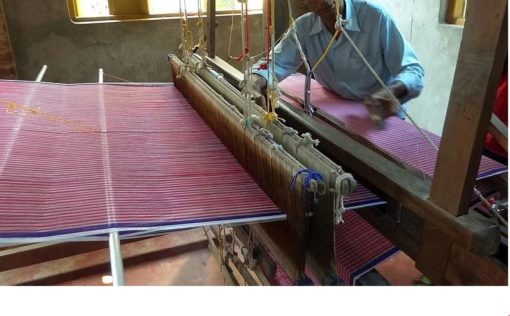
A handloom weavers’ collective based in rural Karnataka, has requested the government to take back the fund of ₹33 lakh, which has been delayed by seven years due to bureaucratic hurdles.
The decision was conveyed to the Development Commissioner of Textiles in a letter dated June 6, 2019 by theatre personality and handloom activist, Prasanna, who is also the founder of DESI, an NGO and Charaka, which is a multi-purpose industrial co-operative society run by women.
“We are tired of coming to the government repeatedly for the past seven years. Please take the money back and release us from this red tape,” the letter said.
In 2012, to set up the Institute for Research and Development of Natural Dyes at Heggodu in Shivamogga district of Karnataka, the government voluntarily offered to join hands with Charaka and DESI.
However, the funds appeared in a joint account only in March this year – marking a seven-year wait period that the collective had to go through.
It took two years to earmark the land for the institute, another three years to get a no objection certificate from the Karnataka State Pollution Control Board and about two years to secure permission from the Shivamogga Zilla Panchayat.
After all this, the collective said it was now being asked to submit a new proposal to utilize the money that has landed in the joint account. If they do not do so, the project might get delayed by another one year.
Upset by the turn of events, Prasanna spoke to Newsclick and shared his collective’s experience with the Karnataka’s government.
“If you are giving a single-window clearance to the Ambanis and the Adanis of this country, then why does the government treat [handloom] industry, that provides ten times more job opportunities, that too in rural areas, as second-class citizens?” Prasanna said.
The world of villages in North Karnataka revolves around weaving, he said. The handloom sector, which generates the maximum number of jobs in North Karnataka after farming, takes pride in its handloom weavers who have tried everything – from demonstrations to forming collectives – in preserving the traditional art form. However, they are realising now that pride in a traditional art form is not enough to save the handloom sector.
Newsclick had earlier reported the huge losses that the Karnataka Handloom Development Corporation (KHDC) has been incurring. KHDC was established in 1975 to support handloom weavers. The number of weavers who used to get employment due to the operations of KHDC has significantly dropped, the reason for which can be attributed to the state government’s apathy.
The state’s weavers are also fighting against the dilution of Handlooms Reservation Act, 1985, that allows for the reservation of production of around 11 items – which was 22 earlier – exclusive for handlooms. There have been several attempts in the past to undermine the Act and repeal the provisions by the powerful powerloom lobby groups.
According to a 2015 report by the Centre for the Study of Developing Societies, the main threat to handloom products today is from imitation by powerlooms. The danger is not from powerloom production as such, but from production of cloth, sarees, and dress materials in handloom look-alike designs being sold fraudulently= as 'handloom'. Such practices are also against the law but the government has failed to take action, the collective feels.
According to Prasanna, the return of funds is ‘symbolic’, in a sense that the collective is asking the government and its bureaucracy to change its attitude towards the handloom sector.
“We are not completely helpless yet; don’t treat us like beggars,” he added.




